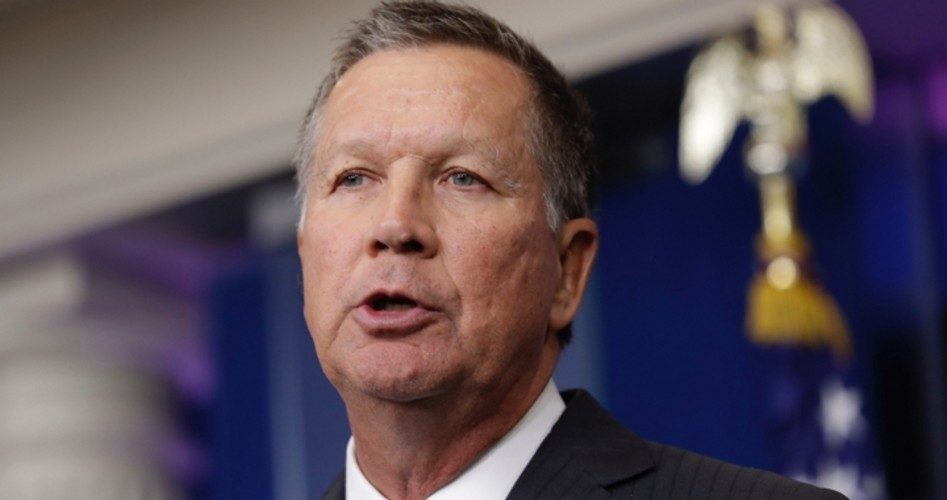
Once again, Ohio Governor John Kasich (shown) used his veto power to kill yet another bill favored by conservatives in his state. On Tuesday, he killed a bill that would have made renewable energy benchmarks voluntary, rather than mandatory, for the next two years.
Kasich defended his action, saying, “Ohio workers cannot afford to take a step backward from the economic gains that we have made in recent years, however, and arbitrarily limiting Ohio’s energy generation options amounts to self-inflicted damage to both our state’s near and long-term economic competitiveness.” Of course, how suspending mandatory benchmarks imposed on electric companies would limit the companies’ “energy generation options,” as opposed to doing exactly the opposite, Kasich did not explain.
Not surprisingly, the Environmentalist Lobby cheered Kasich, who ran for president this year as a Republican. The Sierra Club, National Wildlife Federation, National Audubon Society, and Ohio Consumers’ Counsel all praised the veto. The “benchmarks,” as they are called, were created by legislation in 2008, requiring electric companies to gradually obtain more energy from “renewable sources,” rather than being allowed simply to make a free market decision to buy the least expensive electricity.
Senator Bill Seitz (R-Cincinatti), however, was not pleased. “It is apparent that Gov. Kasich cares more about appeasing his coastal elite friends in the renewable energy business than he does about the millions of Ohioans who decisively rejected this ideology when they voted for President-elect Trump,” Seitz said in a press release. “We can only hope that President Trump and his amazing cabinet of free market capitalists will save us from this regulatory overreach of Al Gore-style policies that take unnecessary money out of ratepayers’ pockets.”
Seitz said he would move to totally repeal the mandates in the next legislative session.
Kasich made it clear by his veto that he does not trust the free market to sort out which type of energy source is best for Ohio consumers. This veto is a confirmation for many more conservative Republicans that Kasich is simply not a conservative.
Ohio legislators can return to Columbus to override this veto, if they wish, and address other vetoes as well, including Kasich’s controversial veto of a pro-life bill. While he has long portrayed himself as a pro-life governor, Kasich vetoed a bill which included a provision to outlaw abortion as soon as a fetal heartbeat can be detected, which can be as early as six weeks.
In his veto of the pro-life bill, Kasich said, “I have deep respect for my fellow members of the pro-life community and their ongoing efforts in defense of unborn life.” But, he added, “Similar legislation enacted in two other states has twice been declared unconstitutional by federal judges, and the Supreme Court declined to review those decisions.” Because it would cost the state money to fight expected litigation from pro-choicers, Kasich argued that his veto of the pro-life bill was “in the public interest.”
During the Republican presidential contest, Kasich defended the implementation of controversial Common Core standards in his state, and attacked fellow Republican candidates who opposed them — fellow governors Scott Walker of Wisconsin and Bobby Jindal of Louisiana, as well as former Governor Mike Huckabee, and U.S. Senators Rand Paul, Ted Cruz, and Marco Rubio. At the time, Donald Trump was not mentioned, although Trump also opposed Common Core, seen by conservative opponents as an attempt to nationalize public education.
There have been numerous other deviations from conservative principles by Kasich, including his backing of the expansion of Medicaid in Ohio under ObamaCare. When Kasich was in Congress, he was one of only 42 Republicans who voted for President Bill Clinton’s ban on assault rifles. He also favors granting U.S. citizenship to illegal aliens.
Clearly, Republican primary voters made a good decision to reject John Kasich for the Republican nomination for president.
Photo of Gov. John Kasich: AP Images


